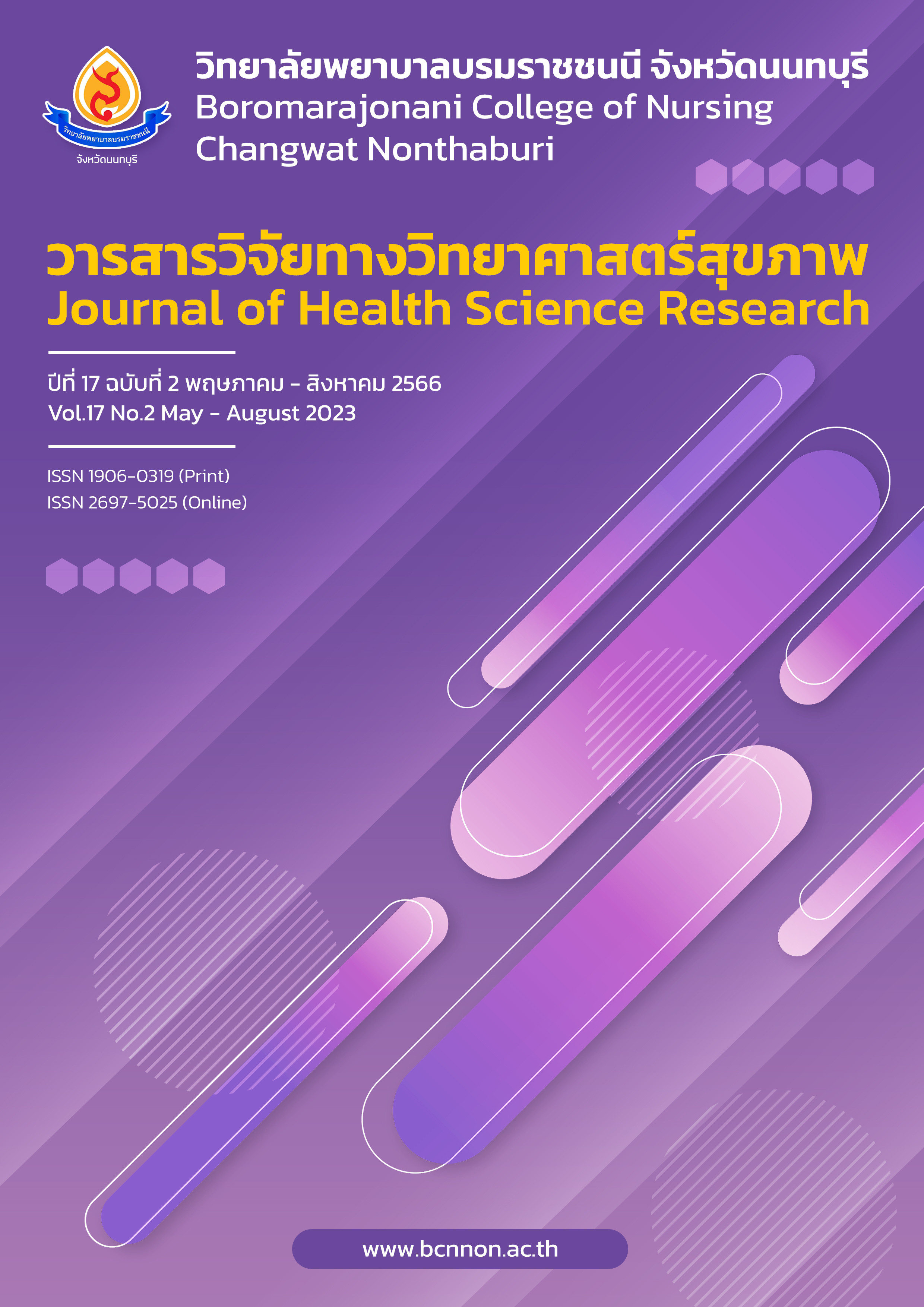การฟื้นสภาพของผู้ใช้ยาและสารเสพติด และรูปแบบการดูแล: บทเรียนจากสถานการณ์โควิด 19
Main Article Content
บทคัดย่อ
การแพร่ระบาดของโรคโควิด 19 ส่งผลต่อการเพิ่มจำนวนและสัดส่วนของผู้ใช้ยาเสพติดทั่วโลกอย่างมีนัยสำคัญ ผู้ใช้ยาเสพติดมีอายุน้อยลง รูปแบบการใช้ยากลับมีความรุนแรงขึ้น และการเข้าถึงการบำบัดยาเสพติดทำได้ยากขึ้น บทความนี้มีวัตถุประสงค์เพื่อนำเสนอการฟื้นสภาพของผู้ใช้ยาและสารเสพติดที่มุ่งเน้นในการบำบัดรักษาแบบองค์รวม และบทบาทสำคัญของพยาบาลผู้บำบัดในจากสถานการณ์การแพร่ระบาดของโควิด 19 โดยทบทวนแนวคิดการฟื้นฟูสภาพ (resilience) ของผู้ใช้ยาและสารเสพติด รูปแบบการดูแล และบทบาทของพยาบาลในการบำบัด โดยให้มุมมองเกี่ยวกับรูปแบบการดูแลผู้ใช้ยาและสารเสพติดบนพื้นฐานการบูรณาการ การทำงานร่วมกันของทุกภาคส่วนและสหสาขาวิชาชีพ เพื่อให้มีการดูแลผู้ใช้ยาและสารเสพติดอย่างทั่วถึงและมีประสิทธิภาพ จึงนำเสนอแนวคิดการฟื้นสภาพร่วมกับรูปแบบการดูแลแบบทางไกลซึ่งเหมาะสมกับสถานการณ์ที่การดูแลผู้ป่วยมีข้อจำกัด รูปแบบการดูแลผู้ใช้ยาและสารเสพติดในสถานการณ์โควิด 19 ที่เหมาะสม ประกอบด้วย 1) การดูแลผู้ใช้ยาและสารเสพติดโดยใช้แนวคิดการฟื้นสภาพ 2) ปรับการให้บริการเป็นรูปแบบการให้บริการทางไกล และ 3) บทบาทพยาบาล ด้านการปรึกษา บำบัด ติดตาม สร้างเครือข่าย การให้ความรู้ และการพัฒนานวัตกรรม อย่างไรก็ตามการดูแลเพื่อการฟื้นสภาพด้วยระบบให้บริการทางไกลยังมีข้อจำกัดในเรื่องการเข้าถึงบริการ เนื่องจากความสามารถในการใช้เทคโนโลยีของผู้ใช้ยาและสารเสพติด ดังนั้นการบำบัดรักษาแบบกลุ่มต้องมีการพัฒนาเพื่อรองรับสถานการณ์การวิกฤตสุขภาพที่อาจเกิดขึ้นในอนาคต
Downloads
Article Details

อนุญาตภายใต้เงื่อนไข Creative Commons Attribution-NonCommercial-NoDerivatives 4.0 International License.
บทความที่ได้รับการตีพิมพ์เป็นลิขสิทธิ์ของวิทยาลัยพยาบาลบรมราชชนนี จังหวัดนนทบุรี
ข้อความที่ปรากฏในบทความแต่ละเรื่องในวารสารวิชาการเล่มนี้เป็นความคิดเห็นส่วนตัวของผู้เขียนแต่ละท่านไม่เกี่ยวข้องกับวิทยาลัยพยาบาลบรมราชชนนี จังหวัดนนทบุรี และคณาจารย์ท่านอื่น ในวิทยาลัยฯ แต่อย่างใด ความรับผิดชอบองค์ประกอบทั้งหมดของบทความแต่ละเรื่องเป็นของผู้เขียนแต่ละท่าน หากมีความผิดพลาดใด ๆ ผู้เขียนแต่ละท่านจะรับผิดชอบบทความของตนเองแต่ผู้เดียว
เอกสารอ้างอิง
United Nations Office on Drug Crime (UNODC). World Drug Report 2020 [internet]. 2020 [cited 2023 Mar 1]; Available from: https://wdr.unodc.org/uploads/wdr2020 /documents/UNODC_WDR20_Banner.pdf.
Office of the Narcotics Control Board. Thailand narcotics control annual report 2020. Bangkok: Ministry of Justice; 2020.
Kinorn P, Kalayasili, R. Misuse of medical drugs. In: Kalayasili R, editor. Fact and Figure Illegal substance in Thailand 2017-2020. Songkla: center of alcohol studies; 2020.
American Psychiatric Association. APA dictionary of psychology. 2018 [cited 2023 Mar 1]. Available from: https://dictionary.ap a.org/addiction.
Kalayasiri R. Addiction & psychiatric complications. [internet]. 2018 [cited 2023 Mar1]; Available from: https://cads.in.th/ cads/content. (in Thai).
Department of Correction. Statistical report on correctional cases under the Narcotics Act nationwide. [Internet]. 2023 [cited 2023 Mar 1]; Available from: http://www.correct.go. th/rt103pdf/report_ index.php?report=drug.
Research Centre for Social and Business Development. Survey of risk perception and addictive behavior during the COVID-19 pandemic. [Internet]. 2020 [cited 2023 Mar 1]; Available from: https://cads.in.th/cads/c ontent?id=111. (in Thai).
Thewjitcharoen Y, Krittiyawong S, Nakasatien S, Himathongkam T. Kratom-associated mixed cholestatic-hepatocellular liver injury in a patient with long COVID: a case report. Clin Med Insights Case Rep. 2022;15:1-6. doi: 10.1177/1179547622113 2824.
Muller E, Hillemacher T, Muller CP. Kratom use for depression/anxiety self-management: challenges during the COVID-19 pandemic - a case report. Heliyon. 2021;7(5): e07039. doi: 10.101 6/j.heliyon.2021.e07039.
Rudzinski K, McDonough P, Gartner R, Strike C. Is there room for resilience? A scoping review and critique of substance use literature and its utilization of the concept of resilience. Subst Abuse Treat Prev Policy. 2017;12:1-35. doi: 10.1186/ s13011-017-0125-2.
American Psychological Association. Building your resilience. [Internet]. 2020 [cited 2023 Mar 11]; Available from: https://www.apa.org/topics/resilience/building-your-resilience.
Abbasi NUH, Muhammad S. State resilience and rate of recovery among addicts: moderating role of social skills. Front Psychiatry. 2022;13:1-8. doi: org/1 0.3389/fpsyt.2022.906935.
Fabelo-Roche JR, Iglesias-More S, Gomez-Garcia AM. Persons with substance abuse disorders and other addictions: coping with the COVID-19 pandemic. MEDICC Rev. 2021;23(2): 55-63. doi: 10.37757/MR2021V 23.N2.2.
Faculty of Law, Thammasat University. New narcotic drugs act: What did the public gain? Will drug abuse decrease [Internet]. 2021 [cited 2023 Mar 11]; Available from: https://www.law.tu.ac.th /seminar-summary-new-narcotic-drugs-act/. (in Thai).
Saingam D. Substance abuse policy in Thailand: current challenges and future strategies. Journal of Drug and Alcohol Research. 2018;7(1):1-10. doi: 10.4303 /JDAR/236058.
Chitov A. The concept of drug offenses in Thai criminal justice. Thammasat Law Journal. 2023;52(1):150-76.
Morse SC, Fockele C, Huynh LN. Zatzick A, Whiteside LK. A qualitative study of people who use methamphetamine during the early COVID-19 pandemic to inform future ED harm reduction strategies. J Emerg Med. 2023;16:1-10. doi: org/10.1186/s12245-023-00505-0.
Clair K, Ijadi-Maghsoodi R, Nazinyan M, Gabrielian S, Kalofonos I. Veteran perspectives on adaptations to a VA residential rehabilitation program for substance use disorders during the novel Coronavirus pandemic. Community Ment Health J. 2021;57(5):801-7.
Sadicario JS, Parlier-Ahmad AB, Brechbiel JK, Islam LZ, Martin CE. Caring for women with substance use disorders through pregnancy and postpartum during the COVID-19 pandemic: Lessons learned from psychology trainees in an integrated OBGYN/substance use disorder outpatient treatment program. J Subst Abuse Treat. 2021;122:1-4. doi.org/10.1016/j.jsat.2020.108200.
Substance Abuse and Mental Health Service Administration (SAMHSA). Adaptations and innovations for delivering mental health and substance use disorder treatment services during the COVID-19 pandemic. [Internet]. 2020 [cited 2023 Mar 1]; Available from: https://www.samhsa.gov/sites/default/files/dtac-adaptations-innovations-covid-19-pandemic.pdf.
Larochelle MR, Bernson D, Land T, Stopka TJ, Wang N, Xuan Z, et al. Medication for opioid use disorder after nonfatal opioid overdose and association with mortality: A cohort study. Ann Intern Med. 2018;169 (3),137–45. doi: org/10.7 326/M17-3107.
Wakeman SE, Larochelle MR, Ameli O, Chaisson CE, McPheeters JT, Crown WH, et al. Comparative effectiveness of different treatment pathways for opioid use disorder. JAMA Netw Open. 2020;3(2):e1920622. doi: org/10.1001/ja manetworkopen.2019.20622.
Costa M, Reis G, Pavlo A, Bellamy C, Ponte K, Davidson L. Tele-mental health utilization among people with mental illness to access care during the COVID-19 pandemic. Community Ment Health J. 2021;57(4):720-26.
Clark L, Fan M, Stahlman S. Surveillance of mental and behavioral health care utilization and use of telehealth, active component, U.S. Armed Forces, MSMR. 2021;28(8):22–7.
Sorkin DH, Janio EA, Eikey EV, Schneider M, Davis K, Schueller SM, et al. Rise in use of digital mental health tools and technologies in the United States during the COVID-19 pandemic: Survey study. J Med Internet Res. 2021;23(4). doi: org/10.2196/269 94.
Liese BS, Monley CM. Providing addiction services during a pandemic: Lessons learned from COVID-19. J Subst Abuse Treat. 2021;120:1-4.


